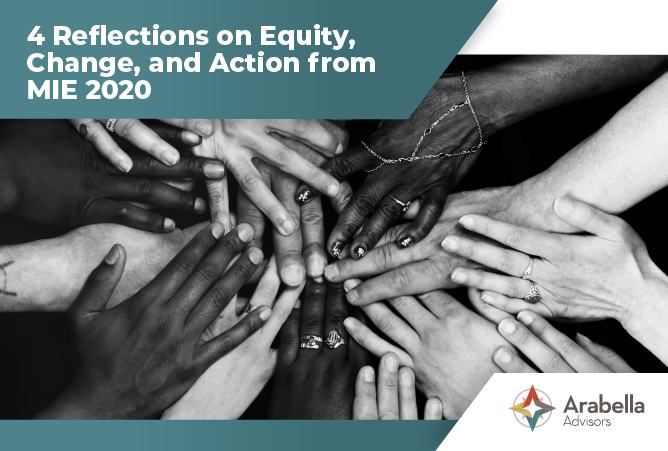4 Reflections on Equity, Change, and Action from MIE 2020

During this time of uncertainty, we all continue to adapt in response to the COVID-19 crisis, Arabella Advisors was proud to be a part of sponsoring the Mission Investors Exchange 2020 virtual conference, one of the first major events in our sector to go totally virtual. We were honored to facilitate conversations with a wide variety of foundations using impact investing as a tool to advance their philanthropic missions and build more sustainable, equitable, and thriving communities. As we reflect on the event and the need for systemic change—which has become increasingly visible in the weeks since the May conference—four ideas stand out:
- We need to create more equitable access to capital now. Deep-rooted, systemic inequities have dictated who has access to the resources needed to develop communities and economies as well as build personal wealth. Impact investing can help lead the way in creating more equitable access (as described in our recent report, “An Economy for All”), redistributing resources, and making investments that leverage assets to advocate for underserved communities. For example, using guarantees to unlock commercial capital for those deemed high-risk by traditional banks can be a powerful tool for increasing access when the perception of risk is higher than the actual risk, as LOCUS President Teri Lovelace highlighted during the event. Indeed, we believe that recognizing the assets and opportunities present in communities in ways that traditional markets and systems have not is one of the core tenets and benefits of impact investing.
- Let access unlock opportunity. Beyond investing in minority-led businesses, impact investors should look for opportunities to provide more equitable access to the services and tools that are necessary for building and contributing to thriving communities. For example, during the “Cross-Sector Solutions” salon, Shelley Whelpton, a senior managing director at Arabella, lifted up the urgency for accelerating universal, affordable, and dependable broadband internet access. While inequitable access to internet has long been a challenge for many communities, and particularly communities of color, indigenous, and low-income communities, recent events have exacerbated and laid bare these gross inequities. Impact investing, in strategic combination with powerful advocacy, has the potential to accelerate the pace of progress toward affordable broadband access for all.
- This is the window of opportunity for systems change. As we think about how to recover from COVID-19 and address deep-rooted social injustice, we should work to rebuild our social and economic systems in ways that make them stronger and more equitable than before. In a breakout session focused on public-private collaboration in Baltimore, Common Future’s Social Entrepreneur in Residence Sonia Sarkar encouraged attendees not to simply “reset the pins” by returning to a societal status quo that doesn’t adequately serve people and the planet. Impact investing has an opportunity to contribute to social and environmental change at scale, rebuilding our community and economic systems better than they were before. We see this potential come to life in our Good Food Ventures investment club, as early-stage food and agriculture companies replace extractive farming practices with regenerative ones, redistribute excess food to prevent waste, and make healthy food accessible and affordable to underserved communities across the country.
- Now is the time to take imperfect action. During the closing plenary, “Weaving the Threads of Impact: Mobilizing with Urgency for Systems Change,” Heron Foundation President Dana Bezerra called for more foundations to take the first imperfect steps toward these ambitious goals. Referencing a Theodore Roosevelt quote that emphasizes “daring greatly” by taking action, learning from mistakes, and trying again, Bezerra urged MIE attendees not to fear failure. We all should accept that we will not be able to do this work—righting historical wrongs or using impact investing to bring about more equitable futures—perfectly. Our focus should be on acting now to address urgent needs, authentically engaging marginalized voices to help us learn, and strive to better understand and navigate the complexities of power and opportunity.
Throughout this year’s virtual conference, we were struck by the depth of the conversations. Yes, we discussed various perspectives on risk and return—as one would expect from an investing conference—but this year, the deeper look at systemic challenges, equitable opportunities, and authentic approaches rang true in new ways. As our team works to keep our focus on taking action and learning as we go, we hope you will join us, challenge us, and keep us accountable (as our DEI statement requests) as we strive to make the field of impact investing more diverse, accessible, and equitable.
